 | OFFICER IN DISTRESS
| OFFICER IN DISTRESSMasked teens go on a crime spree. With police closing in, one young man reaches out for help.

Jana White, a psychology teacher at West Jordan High School, played a video for her class on Nov. 14, 2002. On screen, psychologist Jackson Katz began: "Boys and young men learn early on that being a so-called real man means you have to take on this tough guise."
Young men are trained, largely through movies and other media, to appear dominant, Katz said, shutting down anything that could look like fear or weakness.
In her lecture afterward, White said such behavior sometimes leads teens to do stupid, even criminal, things, but those actions don't mean they're bad people. Sometimes good people make mistakes.
When the rest of her students filed out to go to lunch, Justin Van Roekel stayed behind, pacing. He looked scared. White had a soft spot for Justin, who wasn't a particularly devoted student, though he had a passing grade at the time.

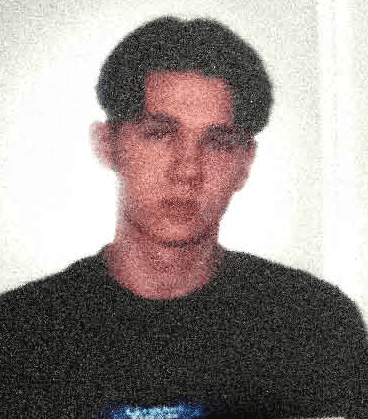
“
I'm a bad kid. I've done bad things."
Justin Van Roekel
The 17-year-old junior always wore a black or white T-shirt, jeans and basic sneakers, which White took as a sign that his family wasn't well-off. He stood about 6 feet tall, with acne and dark brown floppy hair that hung to his eyebrows. She remembers Justin as often smiling, but in his class photo, which looks an awful lot like a mug shot, his expression is blank, perhaps impatient.
When the last student left, Justin started sobbing. His body shook.
"I'm a bad kid," he told her. "I've done bad things."
As he cried, Justin said he'd been involved in a series of robberies and shootings and felt like he was "going over the edge." He had wanted to shoot two people during a robbery because "they were acting scared in a funny way." He believed he'd eventually turn into a serial killer. He said he wanted to shoot police officers, "shoot up the school" and maybe even shoot himself.
He wasn't finished.
Justin said he was a member of two gangs, had been involved in a bank robbery in which he made off with $500,000, had participated in drive-by shootings and had played a role in four murders.
His mother was dead, he said, and his father had taken him to a hospital the week before because he had overdosed. He said he used heroin, cocaine, meth, PCP and more. Only when strung out did he evade the constant urge to hurt somebody.
He talked for 25 terrifying minutes.
White was shocked, but she also suspected that the rail-thin introvert was exaggerating.
She tried to remain positive, telling Justin he could still fix things, even if he would have to face some consequences. She remembers Justin saying he couldn't go back to juvenile detention, where he felt a past stay only worsened his problems. She told him he had other options, maybe counseling.
The bell rang, and students started to drift into her classroom. Justin, in a panic, asked her for a ride. She said she couldn't leave the school. "OK, OK. … I just gotta go," he said, and then rushed out.
"What the heck just came out of that kid's mouth?" White thought.
As the "Tough Guise" video played for her third class of the day, White tried to think through Justin's wild claims. Most likely he was lying, she thought, and he wouldn't shoot anybody — but if anything he said was true and Justin's friends found out they talked, she could be in danger.
She consulted with her husband and then talked to the vice principal, who called in crisis counselors from the district and Detective Richard Schaffnit, the school resource officer. Schaffnit ran Justin Van Roekel through police databases and something popped up. He called Detective Brent Jex.
The plan was to confront Justin the next morning. White said she would help, but only if police promised that Justin wouldn't be rushed to juvenile detention. School administrators and officers agreed to enroll him in a drug-treatment program, and they prepared a document for Justin and his father to sign.
The only thing left up in the air was whether Justin would show up for class.
Justin had moved in with his father the previous year and enrolled in West Jordan High as a 10th-grader. His mother wasn't dead; she was living in New Mexico.
In stairwell conversations with friends, Justin often complained about his father, saying he once hit Justin so hard that his ears bled. They weren't sure that actually happened, but they felt Justin's persistent gripes about his dad went beyond normal teenage angst.
His closest friend was Tyler Atwood. They were largely uninterested in school and would frequently skip it. Since Tyler's parents worked late, Justin would hang out in Tyler's basement bedroom, where they would crank up the rap group Insane Clown Posse and smoke pot.
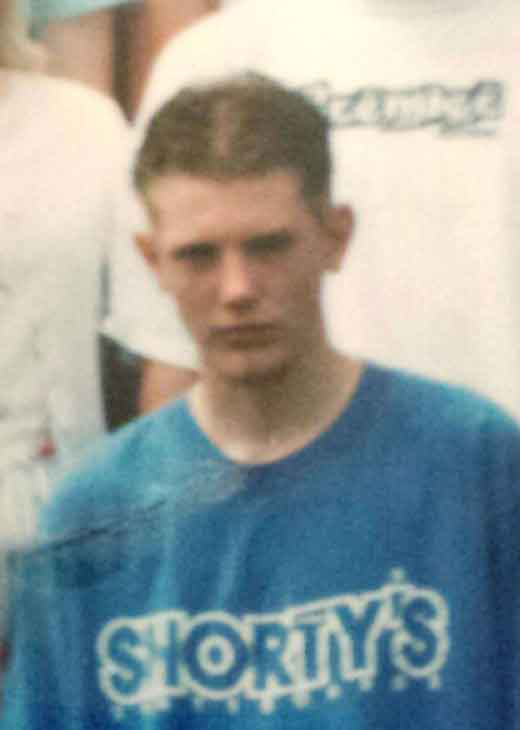
Tyler Atwood, a close friend of Justin Van Roekel
Courtesy photo
Tyler essentially dropped out of school in the 11th grade. He was addicted to drugs, moving from pot to cocaine. His dealer, a gang member, also sold him a Hi-Point 9 mm handgun. It's about the cheapest gun available, made of lower-quality metal than most firearms. At the time, it cost less than $100.
Justin and Tyler had minor run-ins with police — for things like marijuana possession and shoplifting. They used the Hi-Point for the first time June 20, 2002, shortly after Justin finished his first school year in Utah.
That night, two girls who worked at a McDonald's in West Jordan told Tyler and Justin about the security cameras, the cash registers and how the safe in the back office worked. Tyler was dating one of them and gave her a $100 bill for the information. Justin, who hadn't met either girl before, told them his name was Bob. It was after midnight, but the two walked straight to the restaurant, where they knocked on the drive-thru window and ordered two Big Macs, handing the cashier, Thelma, a $5 bill.
At that hour, only one cash register in the main part of the restaurant was in use. When Thelma started walking toward it, Justin and Tyler pushed their way through the window.
Justin carried the Hi-Point while Tyler brandished a knife. They screamed orders at the three employees, who, except for Thelma, spoke scant English. Tyler cut the phone lines and pocketed a cellphone sitting on the counter, while Justin ordered two of the workers to sit on the floor.
He told Thelma, the night supervisor, to get the cash. After emptying the safe, they stuffed roughly $3,300 into a black backpack. They told the three employees to keep their heads down and to not move for 10 minutes. Tyler and Justin then jumped out of the drive-thru window. They'd give some of the cash to Tyler's girlfriend, then split the rest.
On June 20, Justin and Tyler forced their way into the drive-thru window of a McDonald's in West Jordan, stealing roughly $3,300.
Photos from the West Jordan Police Department
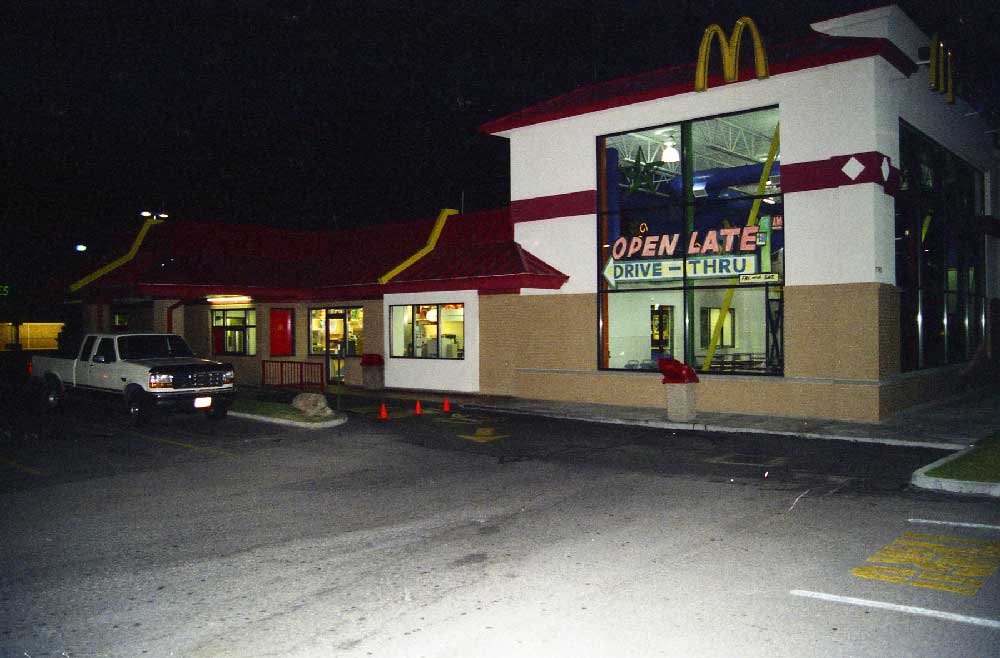
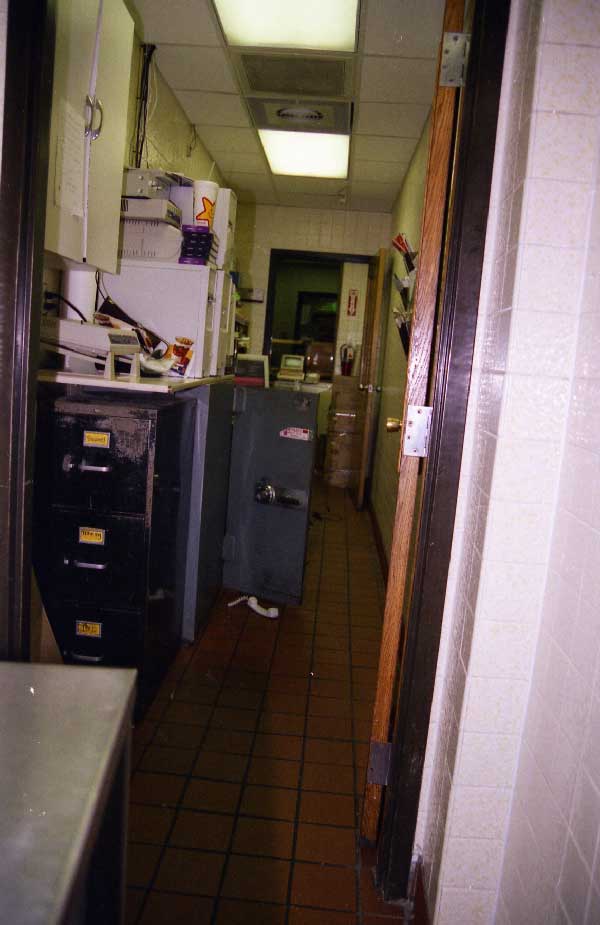
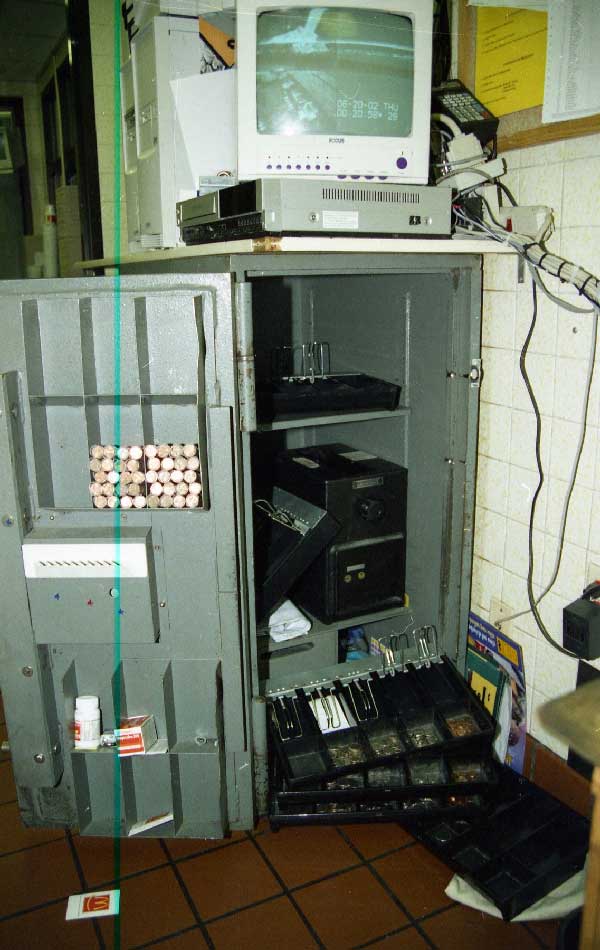
Just a few minutes after the robbery, a man pulled into the McDonald's for a late-night snack, finding the traumatized workers. They piled into his car, and he drove them to the police station.
One robber wore a dark hoodie and baggy jeans; he had a scruffy goatee and acne scars, they told police, describing Justin. The other had a gray hoodie and a light mustache, and they were sure they could identify the pair if police could provide a photo.
Three days later, Tyler's girlfriend told her mom what happened. Soon afterward, the teen spoke with detectives saying she had told Tyler and "Bob" how to avoid security cameras and get the most cash. Using a phone number and a rough address, West Jordan police figured that Bob may have been Robert Van Roekel, Justin's father, though they did little to verify the information.
Police did question Tyler, who was adamant that he had played no part in such a crime. Detectives took notes, then the case went dormant. They never showed mug shots to the McDonald's employees. Tyler and Justin thought they got away with it.
At 2 a.m. on Sept. 19, two night owls called police about a white Mercury Sable cruising their neighborhood. West Jordan Officer Robert Faircloth drove by, saw the same suspicious behavior and decided to tail the Sable.
The driver, Sean Tims, and his passengers, Tyler and Justin, spotted the police car behind them. They had two guns, though not the one used in the McDonald's robbery, and two knives. They had just bought a night vision scope, knit hats and gloves.
Tyler and Justin tried to stash their stuff under the seats while a flustered Sean made a right turn and then a left, steering them into a cul-de-sac. He could turn around, signaling that he didn't know where he was headed, or he could play it cool. Sean pulled his mother's car into a stranger's driveway, got out and started walking toward the front door.
Officer Faircloth stopped him.
"How old are you?"
"Sixteen."
"What are you doing out so late?"
Sean said he came to visit a friend.
Faircloth told Tyler and Justin to get out of the car, and they did. West Jordan Officer Doug Saunders arrived to provide backup as Faircloth asked Sean to let them search the Sable. Sean had opened the passenger-side door and started leaning in when Faircloth spotted the weapons and yelled, "Gun!"
The two officers pulled their weapons and ordered the teens to the ground. They didn't comply immediately, so Saunders grabbed Sean and started cuffing him. Justin and Tyler got down on the driveway. Faircloth approached Justin first and just as he slapped his handcuffs around one wrist, Tyler jumped up and sprinted down the block. Faircloth pushed Justin to the ground and took off after Tyler, running into Jordan Meadows Park. Justin, with Faircloth's handcuffs dangling from one arm, ran in another direction.
All Saunders could do was watch. He threw Sean into the back of his car and searched the Sable, where he found the weapons, ammo, gloves and masks. West Jordan scrambled police dogs, but they didn't find the other teens.
Sean played dumb, saying he didn't really know those guys and while he was aware they were carrying guns, he didn't know anything about the hats, gloves or night vision scope. The officer cited Sean for having loaded firearms in a car and for "burglary tools," then he released him to his older sister.
Faircloth and Saunders next headed to Tyler's house, where his mother handed over his cell number. Back at the station, Faircloth called and Tyler answered. The officer told Tyler he had their names and knew where they lived, so not turning themselves in was only making it worse. A few minutes before 6 a.m., Robert Van Roekel drove his son, who still was wearing the handcuffs, and Tyler to the station.
Officers talked to Tyler first. He admitted to buying the gloves and knit hats and said the scope was his. So what were they planning? He'd only say the guns were for "future use." Justin's story was similar, except he said they were going to drive into the mountains and fire off some rounds.
The department's gang protocols kick in any time three teenagers are involved in a crime, and that meant Faircloth and Saunders had to clue in West Jordan's man on the Metro Gang Unit — Brent Jex. He had been promoted to detective after a little less than three years working patrol, a quick rise. As a fresh recruit, Jex bought his own Polaroid camera to take pictures of suspected gang members and studied where they hung out. His fellow patrol officers would often call him so he'd have a chance to talk to a suspect before the detective or sergeant arrived.
But this night, he didn't talk to Tyler or Justin, thinking the patrol officers had it handled. They told him the two guns didn't come up as stolen, but one 9 mm appeared to have its serial number intentionally obscured with scratches.
Jex called juvenile detention, asking to book all three, but because of a shortage of beds, the facility wouldn't take the teens over a single, nonviolent offense. Faircloth still wanted to cite Justin and Tyler, and he said so in a subsequent report, but Jex told him not to. He planned to ask his buddy at the Bureau of Alcohol, Tobacco, Firearms and Explosives to research the guns, a process that could take weeks. He'd rather charge them later with having a stolen firearm, a more serious crime, than a misdemeanor that night. The officers cut Justin and Tyler loose.
Less than three weeks later, two young men, one carrying a gun, walked to a Phillips 66 gas station dressed in black and wearing masks made famous by the movie "Scream" — a white, elongated ghoul face wrapped in a black shroud. They wanted cigarettes. A woman working at the station opened the cage and stepped back. The guys swept 30 packs of Marlboro Reds into a black backpack and ran.
Two weeks after that, on Oct. 25, Tyler and Justin hit the same McDonald's they had robbed in June, and they did it the same way, climbing in the drive-thru window, now decorated with a cartoon mummy, pumpkin and bear for Halloween. This time, they wore "Scream" masks. They took $2,419 from five tills and the backup safe.
Erika Medina was there both times. "I could guarantee that the voices of these two people were the same as the voices of the people who robbed us the time before, and they were the same height," Medina wrote in Spanish in a statement for police.
Three friends were talking outside a bowling alley near the McDonald's when they saw two people in masks run through the shared parking lot, climb in the drive-thru and then, about a minute later, make a hasty retreat in a blue Honda Civic. They got the license plate and showed police where the car had been parked during the crime. Sitting on the ground were two balled-up tissues; one was bloody.
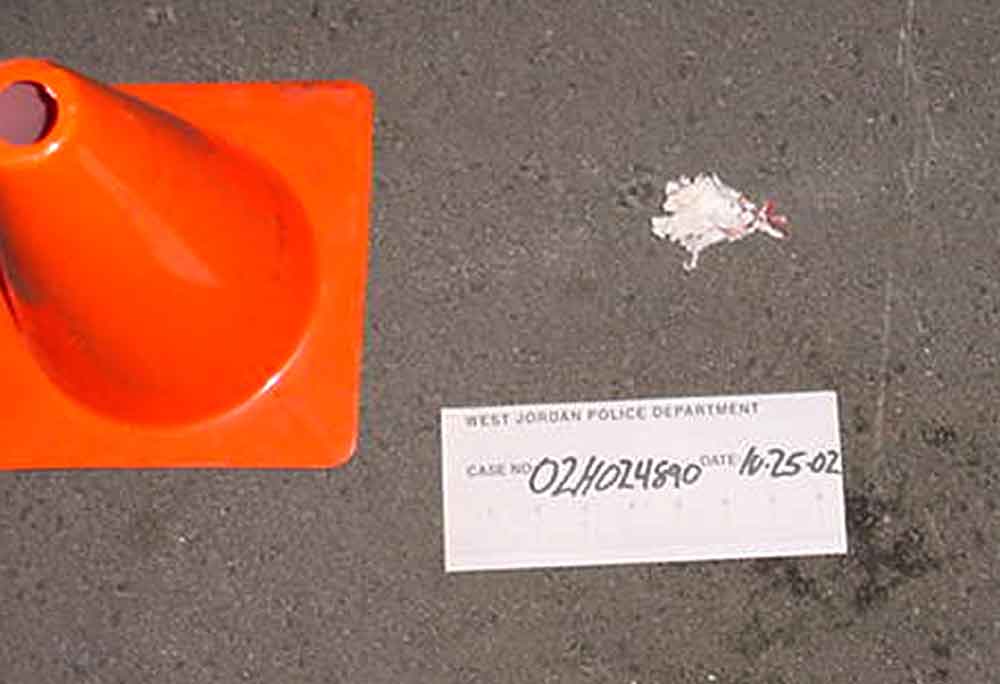
Police find a tissue with blood on it after an armed robbery at a McDonald's on Oct. 25, 2002.
Photo from the West Jordan Police Department
It wasn't long before police found the Civic parked near Tyler's house, with drops of blood on the driver's door. Alerted to the Atwood connection, Jex rushed over.
Tyler told the detective he had been hanging with a friend named Colby all night and knew nothing about any robbery or the stolen blue Honda down the street. Jex asked to look at his hands. Tyler complied, and there it was: a cut.
Police had Medina's witness statement, along with the blood at the scene and on the stolen car — but they didn't arrest Tyler or search his house. Detective Richard Davis, who had handled the first McDonald's robbery, wanted the hard proof of DNA. He got a search warrant to draw some of Tyler's blood, and the samples were sent Nov. 6 to the overworked state crime lab. They'd sit untested for weeks.
The "Scream" robbers would strike again, hitting the city's Food 4 Less on Nov. 13, leaving with $441 and 12 cartons of Marlboro Milds. Sean said he ran into Justin and Tyler before the robbery and saw Tyler holding his mask. He warned them to change it up so they wouldn't get busted, but Tyler said the cops already had his blood on the car after the last McDonald's raid. Essentially, there was nothing to lose.
Justin acted cool, but he was starting to panic. The next day, after watching "Tough Guise," he decided to confide in his psychology teacher.
Mental health resources
Learn about the Utah Fraternal Order of Police Mental Health Program.
See DunamisPolice.org's page about trauma and mental health.
Find help for anyone experiencing suicidal thoughts at 1-800-273-TALK (8255). Utah also has crisis lines statewide.
The SafeUT app offers immediate crisis intervention services for youths and a confidential tip program.





